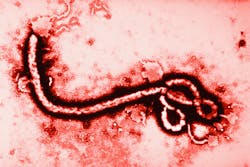NEW ORLEANS — OSHA requires protective gear for a reason, Bev Potts told plumbing contractors at Plumbing-Heating-Cooling Contractors – National Association’s CONNECT 2014 here. Potts, a licensed plumber in addition to being executive director of the Illinois Chapter of PHCC, said she’s seen lots of “tough guys” who wouldn’t protect themselves against disease and injury, and they’re dead now.
Plumbers face dangers from asbestos, dust, lead, chemicals, silicosis, steam burns, biting vermin, poison ivy, and sharps carrying blood-borne diseases, Potts explained.
Potts said she once augured out both a dead squirrel and dirty diapers from a DWV.
Even if they are tough guys, Potts urged the contractors to think about the dangers of exposing their children to harmful substances. They can bring home animal diseases, such as Leptospirosis or Parvovirus, on their boots or trucks tires that could kill their dogs.
What would be the impact on the company if the owner is sick for an extended period?
So when you pull out the Sawzall and cut into something, what exactly are you splashing on your face? Potts provided a long and scary list.
Gastroenteritis is caused by noroviruses that sometimes come from parasites or E. Coli. Giardia lamblia is a parasite that lives in your intestines and comes from contaminated food, soil or water and sometimes feces, Potts explained. You could be a carrier and not have symptoms. Cryptosporidium can live outside the body for a long time and tolerates chlorine. It’s spread via water and can kill those with compromised immune systems. Reverse osmosis removes it from domestic water.
Legionella symptoms appear after two to 10 days, and include headaches, chills and muscle pain, followed by pneumonia. It can come from spas, cooling towers or decorative fountains.
There are three types of Hepatitis, all liver diseases, which can come from fecal matter, water, illicit drug use or unprotected sex. Hepatitis A is not fatal but there is no treatment. There is a vaccine for Hepatitis B and most adults can recover from it. Hep B comes from blood and bodily fluids and can come from sharing razors, unprotected sex or tattoos. You can be a Hep B carrier. Hepatitis C causes permanent liver damage and kills 15,000 people a year. There is no vaccine. Beware of sharps and bleeding co-workers. Helping an injured co-worker may be instinctive, but put on protective gear first.
Staphylococcus aureus is everywhere. It’s on your hands now (did you look?). Staph can live on towels and linens and enters through cuts. Be careful working in schools and hospitals, Potts cautioned. Some strains are resistant to antibiotics.
Cholera is a diarrheal disease that’s spread through contaminated water. A few people have caught it from eating raw shellfish from the Gulf of Mexico.
Clostridium difficile, commonly called C-Dif, is a life threatening bacteria often seen in hospitals and long-term care facilities. It kills 14,000 people a year. It is resistant to Purelle and other hand sanitizers.
HIV. There are 50,000 new infections a year. It’s spread through blood and bodily fluids.
Beyond the bugs, Potts pointed out, plumbing contractors face other harmful substances in the course of their work. Sewer gas, a byproduct of decomposition, can destroy your sense of smell so you don’t realize you’re breathing ammonia, methane and hydrogen sulfide. Ventilate all confined spaces.
Methamphetamine labs are a chemical soup, and the chemicals can remain in sinks, drains and ventilation systems. You should not enter a structure that housed a meth lab until it has been cleaned by specialists.
Mosquitoes and ticks can causes diseases such as Rocky Mountain Spotted Fever and Lime Disease.
Potts urged the contractors to use the tools available to them — masks, face shields, goggles, shoe covers, body suits and insecticides. Clean tools. Don’t bring contaminated items home with you. And wash your clothes separately.
About the Author
Robert P. Mader
Bob Mader is the Editorial Director for Penton's mechanical systems brands, including CONTRACTOR magazine, Contracting Business and HPAC Engineering, all of which are part of Penton’s Energy and Buildings Group. He has been with CONTRACTOR since 1984 and with Penton since 2001. His passions are helping contractors improve their businesses, saving energy and the issue of safeguarding our drinking water. He is a graduate of the University of Notre Dame with an A.B. in American Studies with a Communications Concentration.
